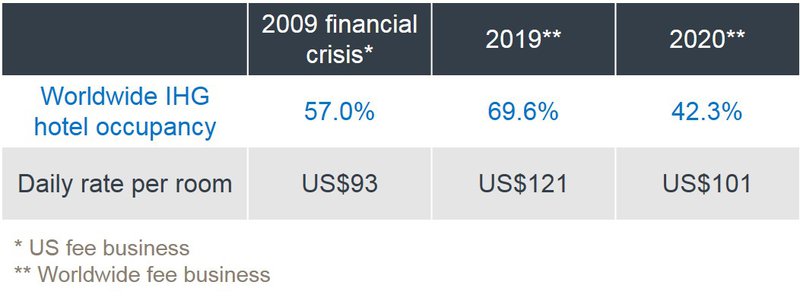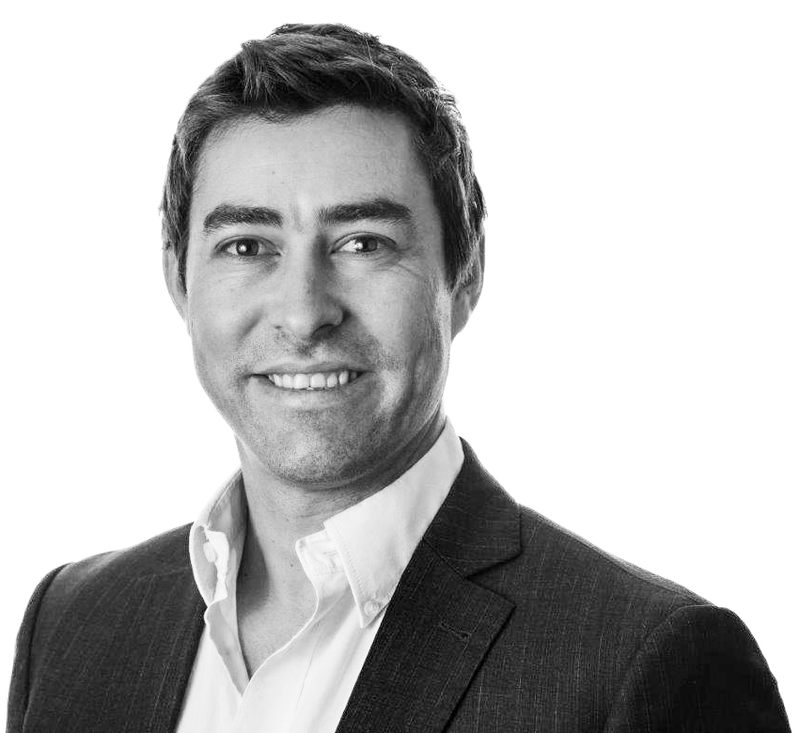Stay abreast of COVID-19 information and developments here
Provided by the South African National Department of Health
IHG: focus on
quality pays off
When share prices plummet as they did in the first quarter of last year, it’s not always easy to make a convincing case for continuing to hold a good-quality, but hard-hit company – especially one in the beleaguered hospitality sector. A year ago, we not only held on to but strengthened our position in Intercontinental Hotels Group (IHG). With the benefit of hindsight, was this an appropriate investment call given the challenges the embattled hotel industry is still facing? Is our investment case still intact?
As managers of the Sanlam Active UK Fund, our investment strategy is simple – we focus on high-conviction, buy-and-hold investing in good-quality businesses. The quality overlay reduces risk considerably – when a crisis hits, owning superior businesses allows us to keep our faith in our existing holdings instead of running for the hills. It also allows us to buy more when these companies do experience irrational sell-offs. We can be bold in times of uncertainty.
A good example is our holding in Intercontinental Hotels Group (IHG). After thorough research, we established a large position in IHG in the Sanlam Active UK Fund in 2019 at around £46 a share. The share price soon rose to a high of £57.
Enter 2020. As news of the COVID-19 virus spread and stocks started to sell off as early as January last year, the IHG share price fell dramatically from its highs and we used the opportunity to top up our position at around £45.
A little over a year ago, we wrote about the exceptional opportunity available in the shares of IHG, detailing our investment case. At that stage, IHG was one of our biggest positions – it is currently our largest.
Our views seemed somewhat bold at the time – investors really were in a position of trying to look through the fog. COVID-19 was spreading throughout the world and economies were shutting down. The MSCI World Index had fallen by 11% and the S&P 500 had dropped by 12%. IHG shares had come off from their peak of £57 in 2019 to around £42, a fall of 26%.
We argued then that IHG, notwithstanding the immediate crisis of the pandemic, was a very high-quality hotel franchise business, with a normalised return on invested capital of over 100% and exciting prospects for growth. The group’s key market is the US, but it has a strong and growing business all over the world. China is a particular focus, and its business there is growing in leaps and bounds. While COVID-19 resulted in a very scary crisis – the worst in the history of the hotel industry – we believed IHG had the balance sheet and business model to survive and indeed to flourish after it was all over.
We also laid out a mathematical valuation argument that short-term disruptions to cash flows have little impact on the intrinsic value of a good business with unimpaired prospects that will be generating cash flows decades into the future. The share price at that point had fallen far more than in any reasonable scenario we could paint of the virus’s impact on the value of IHG. We really only had to answer two questions: Is the long-term outlook for the company still attractive? And can the company survive the crisis? The answer to both these questions a year ago, and now, is a resounding yes.
What has happened since then? The share price continued to fall as the crisis intensified. Many governments worldwide started ordering lockdowns, as death rates and infection numbers went through the roof. The share price finally hit rock bottom on 19 March 2020 at around £23, before rebounding quickly to the low £30s and beginning a mostly steady climb back to today’s levels at around £52 a share. A year ago, investors had taken their eye off the ‘long-term ball’, so to speak, but the market is again focusing on the quality of the business and its growth prospects.
Looking at the financial impact on IHG’s hotel operations last year lays bare the severity of what happened. The group earns royalty revenue from its hotel franchisees on each room night sold. Room occupancy and room rates are thus the key revenue drivers. Normalised occupancy for IHG hotels is around 65%. As the table below shows, this fell to 42% last year, the lowest in the group’s history. There were some months last year where occupancy struggled to stay above 20%. To put last year into context, room occupancy ‘only’ fell to 57% in the 2009 financial crisis. Daily room rates also fell dramatically.
IHG fee business revenue drivers

The net effect was that IHG revenues fell an unprecedented 55% in 2020. Despite this, the group managed to generate an operating profit of US$219 million (down 75%). Free cash flow fell from US$550 million to US$29 million. These are dramatic but temporary falls, and the fact that IHG remained profitable and free-cash-flow positive in the hotel industry’s worst year was a validation of the franchise business model and a strong confirmation of the quality of the group’s hotel brands.
Things have started to get better as vaccines are rolled out globally. IHG’s Chinese business is already back to where it was pre-COVID-19. Steady improvements are being seen at the group’s hotels worldwide, the vast majority of its hotels are open, and countries like the UK are about to reopen. By our estimates, we think that IHG will produce more profit and cash flow in 2022 than it did in 2019, and that the long-term growth trajectory will resume. We are happy holders of the share. IHG is the largest position in our fund at 6.1% and we think the shares are still undervalued, even after they have more than doubled from the lows.
High-quality companies with structural growth opportunities are often priced expensively. True bargains are rare – unless there’s a short-term crisis that makes investors sell shares and flee. For most of last year, and even now, there has been a lot of uncertainty around hotels and the future of travel. IHG’s high-quality business model, and our long-term approach, gave us the confidence to hold on to our large position, and also to buy more shares. A well-known investor from Omaha once advised investors to ‘be greedy when others are fearful’ – and we were.
Sanlam Private Wealth manages a comprehensive range of multi-asset (balanced) and equity portfolios across different risk categories.
Our team of world-class professionals can design a personalised offshore investment strategy to help diversify your portfolio.
Our customised Shariah portfolios combine our investment expertise with the wisdom of an independent Shariah board comprising senior Ulama.
We collaborate with third-party providers to offer collective investments, private equity, hedge funds and structured products.
We provide daily reporting of trades, monthly portfolio evaluations and annual tax reports to clients.
Riaan Gerber has spent 16 years in Investment Management.

Have a question for Riaan?
South Africa
South Africa Home Sanlam Investments Sanlam Private Wealth Glacier by Sanlam Sanlam BlueStarRest of Africa
Sanlam Namibia Sanlam Mozambique Sanlam Tanzania Sanlam Uganda Sanlam Swaziland Sanlam Kenya Sanlam Zambia Sanlam Private Wealth MauritiusGlobal
Global Investment SolutionsCopyright 2019 | All Rights Reserved by Sanlam Private Wealth | Terms of Use | Privacy Policy | Financial Advisory and Intermediary Services Act (FAIS) | Principles and Practices of Financial Management (PPFM). | Promotion of Access to Information Act (PAIA) | Conflicts of Interest Policy | Privacy Statement
Sanlam Private Wealth (Pty) Ltd, registration number 2000/023234/07, is a licensed Financial Services Provider (FSP 37473), a registered Credit Provider (NCRCP1867) and a member of the Johannesburg Stock Exchange (‘SPW’).
MANDATORY DISCLOSURE
All reasonable steps have been taken to ensure that the information on this website is accurate. The information does not constitute financial advice as contemplated in terms of FAIS. Professional financial advice should always be sought before making an investment decision.
INVESTMENT PORTFOLIOS
Participation in Sanlam Private Wealth Portfolios is a medium to long-term investment. The value of portfolios is subject to fluctuation and past performance is not a guide to future performance. Calculations are based on a lump sum investment with gross income reinvested on the ex-dividend date. The net of fee calculation assumes a 1.15% annual management charge and total trading costs of 1% (both inclusive of VAT) on the actual portfolio turnover. Actual investment performance will differ based on the fees applicable, the actual investment date and the date of reinvestment of income. A schedule of fees and maximum commissions is available upon request.
COLLECTIVE INVESTMENT SCHEMES
The Sanlam Group is a full member of the Association for Savings and Investment SA. Collective investment schemes are generally medium to long-term investments. Past performance is not a guide to future performance, and the value of investments / units / unit trusts may go down as well as up. A schedule of fees and charges and maximum commissions is available on request from the manager, Sanlam Collective Investments (RF) Pty Ltd, a registered and approved manager in collective investment schemes in securities (‘Manager’).
Collective investments are traded at ruling prices and can engage in borrowing and scrip lending. The manager does not provide any guarantee either with respect to the capital or the return of a portfolio. Collective investments are calculated on a net asset value basis, which is the total market value of all assets in a portfolio including any income accruals and less any deductible expenses such as audit fees, brokerage and service fees. Actual investment performance of a portfolio and an investor will differ depending on the initial fees applicable, the actual investment date, date of reinvestment of income and dividend withholding tax. Forward pricing is used.
The performance of portfolios depend on the underlying assets and variable market factors. Performance is based on NAV to NAV calculations with income reinvestments done on the ex-dividend date. Portfolios may invest in other unit trusts which levy their own fees and may result is a higher fee structure for Sanlam Private Wealth’s portfolios.
All portfolio options presented are approved collective investment schemes in terms of Collective Investment Schemes Control Act, No. 45 of 2002. Funds may from time to time invest in foreign countries and may have risks regarding liquidity, the repatriation of funds, political and macroeconomic situations, foreign exchange, tax, settlement, and the availability of information. The manager may close any portfolio to new investors in order to ensure efficient management according to applicable mandates.
The management of portfolios may be outsourced to financial services providers authorised in terms of FAIS.
TREATING CUSTOMERS FAIRLY (TCF)
As a business, Sanlam Private Wealth is committed to the principles of TCF, practicing a specific business philosophy that is based on client-centricity and treating customers fairly. Clients can be confident that TCF is central to what Sanlam Private Wealth does and can be reassured that Sanlam Private Wealth has a holistic wealth management product offering that is tailored to clients’ needs, and service that is of a professional standard.